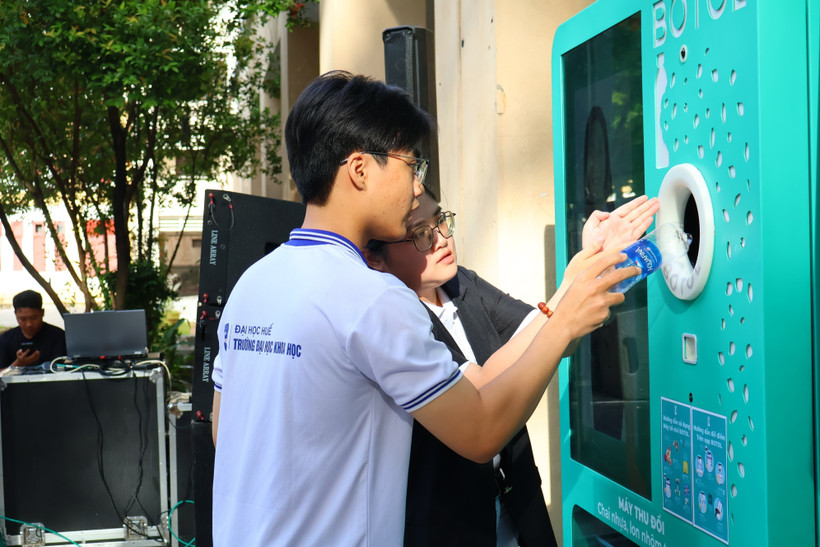The deposit-return system (DRS) pilot program recently launched in Hue City, with the first reverse vending machine installed at Hue University of Sciences.
DRS is a system where consumers pay a small deposit when purchasing bottled or canned beverages and receive a refund when returning the empty containers. It's an effective extended producer responsibility (EPR) tool implemented in over 40 countries, including the US, European nations, and the Middle East. In Norway alone, the DRS has achieved a 92.3% return rate for aluminum cans and plastic bottles.
Hue is the first city in Southeast Asia to pilot this system. Singapore plans to launch a similar pilot next year with a 10-cent deposit (approximately 2,000 VND).
Under this system, consumers pay an additional 1,000 VND for each bottle with the pilot program's barcode. Upon returning the empty plastic bottle, they receive their deposit back, plus an additional 100 VND. The reverse vending machine, developed by Botol Vietnam Co., Ltd., also accepts bottles and cans not included in the program. For these, consumers only receive the 100 VND.
The second reverse vending machine in Hue is scheduled to be installed at the Nera Garden apartment complex on 20/9.
 |
A resident tests the reverse vending machine. Photo: TTXVN |
A resident tests the reverse vending machine. Photo: TTXVN
Plastic bottles and aluminum cans make up 98% of single-use beverage packaging in Vietnam. According to a report on DRS published by the Norwegian Embassy in June, these materials are valuable recyclable resources, but their collection and recycling rate remains low, at around 50%. Moreover, these materials are often contaminated when mixed with household waste.
However, the report suggests that with a deposit of 1,000-2,000 VND per container, Vietnam could achieve a collection rate of 80-90%. The report's authors estimate that Vietnam could collect and recycle an additional 21,000-77,000 tons of used beverage packaging, significantly reducing landfill waste and incineration, especially littering. This could lead to a reduction of 265,000 tons of CO2 equivalent annually, while also mitigating plastic pollution in the ocean.
The DRS pilot program is part of the "Hue - Plastic Waste Reduction City in Central Vietnam" project, funded by WWF-Norway. The pilot's results will inform expansion of the model, promoting awareness and behavioral change in waste sorting at the source, increasing collection and recycling rates, and reducing plastic waste leakage into the environment.
Thuy Truong












